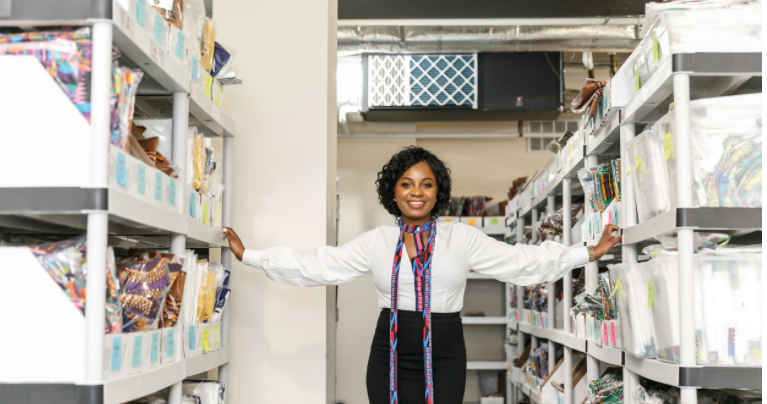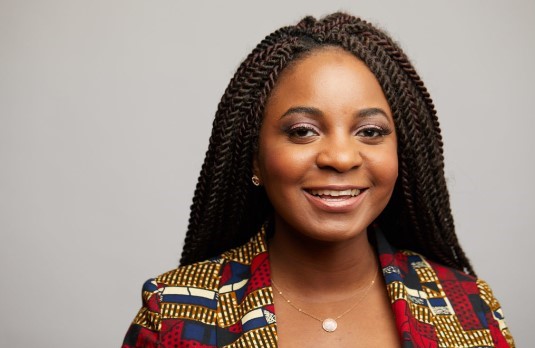Nigerian designer Addie Elabor is a woman cut from the self-made cloth. She launched her Philadelphia-based ready-to-wear African fashion brand D’IYANU in 2014 and has grown it into a million-dollar business.
The company, which focuses on creating culturally conscious-pieced with bold prints, features handmade and ethically sourced products from West African and the United States. Addie shares the strategic moves she made to launch her idea, build a team, and continue to grow an e-commerce business, even in troubling climates.
When did you start your brand and how did you get the idea for it? What inspired you to turn it into a business?
Addie: I was inspired to start D’IYANU at the beginning of 2013 when I realized that there was a void in the fashion world for ready-to-wear African inspired pieces that were easily accessible to people like me. There wasn’t a leading brand that allowed you to celebrate your culture in a modernized way. I asked myself “why not me?”. I immediately had this vision of developing a brand that would become the African print version of Zara or H&M. I didn’t have a fashion background, but the vision was so compelling that I had to make it happen.
At the time I was dissatisfied with my career and relished the opportunity to launch my own business with the goal of building a legacy in mind. D’IYANU was launched in January of 2014 with six women’s styles and has grown exponentially ever since.

What was the first investment you made into D’IYANU to get it off the ground? Why?
Addie: D’IYANU was launched with a $15,000 investment which came from my savings and a credit card loan. The bulk of the initial investment went into producing 50 units each of my first 6 pieces produced in Philadelphia which included the pattern and sample making, fabric, and production of the collection.
Tell us how you were able to scale D’IYANU to a million-dollar business? How long did it take you from the time you started to hit the million-dollar mark?
Addie: The beginning of 2014 was a struggle since I was still working full-time and running the business on the side. I decided to quit my full-time job in May of 2014 to focus full-time on D’IYANU. I knew I needed to invest all my time and attention in order to get the brand off the ground. With the goal of gaining more customers, I would set up at various festivals and even managed to get some products into two boutiques in Philadelphia, but I wasn’t really getting much traction.
I knew that the best place to find customers was online. At the end of September of 2014, I took a course on creating Facebook ads. That course was quite an investment, but it transformed my business practically overnight. With the help of Facebook ads and email marketing, we were able to hit $1 million in sales by the middle of 2016 which took 2.5 years from the launch date.

What makes D’IYANU unique from your competitors or other “African clothing” shops online?
Addie: D’IYANU is unique from other African clothing brands because we are the most innovative and offer the widest range of products for Men, Women and Kids. With the goal of being a lifestyle brand, we offer products that can be incorporated into our customers’ everyday life. Our product offerings include everything from active wear to formal, and office attire. Our innovative spirit is one of our core values that pushes us to explore other types of fabrics and materials so that our items are more comfortable and functional for our customers.
For instance, we use our unique African print stretch woven fabric to make dresses, skirts, pants, jumpsuits, and tops for women so that they’re extremely comfortable and accommodate curves and movement. The fabric looks like the traditional Ankara, but it has amazing stretch and softness.
No other African inspired brand is using this type of fabric. We also print African print on french terry to make our Men’s polo shirts, jogger and hoodie sets. Recently, we launched an iconic Jean Jacket with Kente inspired print for our pre-fall collection and we will be launching more denim and print products in the near future. We’re also looking forward to our knitwear pieces that will be featured in our Fall and Winter collections.
Were you the only person working on your business when you started? When did you realize you needed to hire or build a team in order to be successful?
Addie: I was the only person working on my business up until April of 2015 when I hired my first full-time assistant. I had been working out of my studio apartment up until March 2015 when I moved my operations into an official office space. I realized that my business was growing quickly and I needed the assistance sooner rather than later.
What has been your biggest challenge with growing your business?
Addie: My biggest challenge has been finding quality employees who are also a good cultural fit to fill various roles at D’IYANU. Two additional challenges have been learning to better manage people to bring out the best in them and finding senior employees they can lean on who are operating at a higher level and can provide guidance into their work.
If you knew now what you knew then, what is one thing you would have done differently to accelerate the growth of your business?
Addie: I would have hired a marketing team sooner in order to scale faster. I was doing way too much in the beginning and naturally I couldn’t handle all of our marketing needs.

What is your advice for someone who wants to start an e-commerce business?
Addie: My advice would be to make sure that the product you’re selling has a unique selling point and tells a story that will resonate with a sizable audience. Set aside a marketing budget and make sure to leverage social media marketing early. Lastly, start building your email and SMS list pre-launch so that you already have customers on launch day and continue to grow that list post-launch, since email and SMS marketing offers the biggest return on marketing spend.
Source: Bauce Mag



